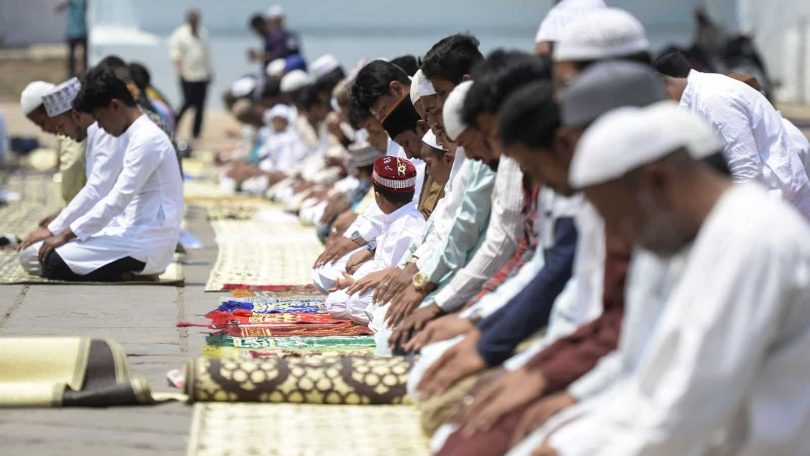[ad_1]
The holy month of Ramadan or Ramzan is almost here and Muslims across the world are eagerly waiting to sight the crescent moon. This year Ramadan is expected to begin from March 22 if the crescent moon is sighted in Saudi Arabia, UAE and other Muslim-majority nations on the evening of March 21. During Ramadan fasting, Muslims who observe the fast or roze, do not eat and drink from dawn to dusk and traditionally break their fast with a date. People with diabetes must be careful while fasting for long hours and seek advice from their healthcare expert regarding adjustment of their insulin dosage or changes in the diabetes medication. While fasting diabetics must monitor their blood sugar levels regularly as they are at risk of hypoglycaemia or hyperglycaemia. Sehri which is the first meal of the day before sunrise needs to be planned well to keep blood sugar levels in check. Adequate hydration, eating nutrient-dense foods and avoiding high-sugar and calorie-dense foods can help manage diabetes during the fast. (Also read: Ramadan 2023: Benefits of intermittent fasting during Ramadan)

“Ramadan is celebrated with month-long fasting during the daytime and having delicious meals early morning and during the night. When people fast for many hours each day, they may tend to indulge in overeating during morning and night meals which can be dangerous for diabetic patients. The food eaten during Ramadan can be fried, oily, and sweet which can raise blood sugar levels and pose dangerous risks like fatty liver, obesity, and hypertension,” says Dt. Vaishali Verma, Consultant- Nutrition and Dietetics, HCMCT Manipal Hospital, Dwarka.
RAMADAN FASTING: PRECAUTIONS FOR PEOPLE WITH DIABETES
Here are some tips to take care of your health as a diabetic patient this Ramadan:
Get enough sleep
One of the things that you should never compromise on is the hours of sleep.
“For our overall wellness, especially during fasting, a sufficient amount of sleep is essential. During Ramadan, you need to have Sehri, your pre-dawn meal, and need enough energy to carry through the day and not feel tired. It is, thus, advisable to wake up at least an hour earlier, freshen up, prepare, and have a meal properly and peacefully. It will help you digest the food and avoid digestive issues later,” says Verma.
Hydrate yourself well before and after fasting
“Hydrating drinks are important for people who are fasting as dehydration is a common and serious risk faced especially by diabetic patients. Lemon water or nimboo pani, buttermilk, coconut water, melons, fresh fruit juices with less sugar, pomegranate molasses, locust bean drinks and rose sharbats help maintain proper body fluids and are quite refreshing and hydrating. Caffeinated drinks like coffee, tea may lead to loss of minerals and salts from the body hence can be avoid,” says Dr. G Sushma – Consultant – Clinical Dietician, CARE Hospitals, Banjara Hills, Hyderabad.
Include probiotics
“A spoonful of yogurt after your sehri meal can work wonders for your health. Not only will it soothe the stomach, but it will also prevent acidity, and keep you safe from getting dehydrated throughout the day,” says Verma.
Open your fast with sugar-free drink
“For Iftar, open your fast with sugar free hydrating drink and then move on to eating in moderation. Steer away from foods that are high on fat content, carbs and salt like samosa, kebabs, poori. Opt for leafy vegetables, fruits, dry fruits and lean meats like skinless chicken, fish. Go for foods that are made with low fat cooking like baking, sustained steaming, grilling and shallow frying,” says Dr G Sushma.
Avoid the three S – salty, spicy, and sugary food
“Limit your spice, salt, and sugar intake during your sehri meal. The sodium in these foods helps maintain the fluid balance in your body. Consuming highly salty food can trigger thirst later as the water from the cells gets withdrawn,” says Verma.
“For Sehri, consume a well-balanced diet which includes fruits, vegetables, whole grain breads, legumes, lean protein, low sugar cereals, milk and juices,” says Dr G Sushma.
Monitor blood sugar levels
“Keep a close check on the blood sugar levels at regular intervals and regulate them before initiating the fasting. Those who take insulin should consult the doctor before fasting. The doctor may advice to increase the dosage of insulin or alter the dose timing. For those on medication, the doctor may advice to shift the medication timing to post sunset. People with co-morbidities like kidney diseases, heart ailments, high blood pressure, uncontrolled Type 1 diabetes should consult the doctor before fasting as they are at a high risk,” says Dr Sushma.
Follow more stories on Facebook & Twitter
[ad_2]
Source link








